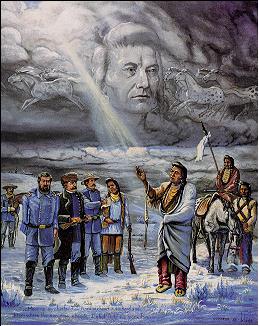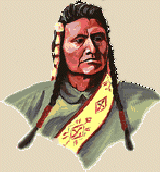

Nez Perce Historical Trail Foundation Chief Joseph's Plea to Congress While Confined in Oklahoma On January 14, 1879, Chief Joseph addressed a large gathering of cabinet members and congressmen. He appealed to President Hayes to allow what was left of his tribe, whose members were dying by the score, to return to their old territory in the Northwest. His appeal was ultimately successful and in 1883, a small party of women and children were allowed to go back to their old home. Chief Joseph was never granted this privilege and spent his remaining days on the Colville Reservation at Nespelem, Washington. He died there September 21, 1904. I have shaken hands with a great many friends, but there are some things I want to know which no one seems able to explain. I cannot understand how the Government hands a man out to fight us, as it did General Miles, and then breaks his word. Such a Government has something wrong about it.... I do not understand why nothing is done for my people. I have heard talk and talk, but nothing is done. Good words do not last long until they amount to something. Words do not pay for my dead people. They do not pay for my country, now overrun by whitemen. They do not protect my fathers grave. They do not pay for my horses and cattle. Good words do not give me back my children. Good words will not make good the promises of your war chief, General Miles. Good words will not give my people good health and stop them from dying. Good words will not get my people a home where they can live in peace and take care of themselves. I am tired of talk that comes to nothing. It makes my heart sick when I remember all the good words and all the broken promises. There has been to much talking by men who had no right to talk. To many misinterpretations have been made; too many misunderstandings have come up between the white men about the Indians. If the white man wants to live in peace with the Indian he can live in peace. There need be no trouble. Treat all men alike. Give them all the same law. Give them all an even chance to live and grow.... You might as well expect the rivers to run backward as that any man who was born free should be contented penned up and denied liberty to go where he pleases. If you tie a horse to a stake, do you expect he will grow fat? If you pen an Indian up on a small spot of earth and compel him to stay there, he will not be contented nor will he grow and prosper. I have asked the Great White Chiefs where they get their authority to say to the Indian that he will stay in one place, while he sees white men going where they please. They cannot tell me. I only ask of the Government to be treated as all other men are treated. If I cannot go to my own home, let me have a home in a country where my people will not die so fast.... I know that my race must change. We cannot hold our own with the white men as we are. We only ask an even chance to live as other men live. We ask to be recognized as men. We ask that the law shall work alike on all men. If an Indian breaks the law, punish him by the law. If a white man breaks the law, punish him also. Let me be a free man...free to travel, free to stop, free to work, free to trade where I choose, free to choose my own teachers, free to follow the religion of my fathers, free to think and talk and act for myself....and I will obey every law or submit to the penalty
|
|


